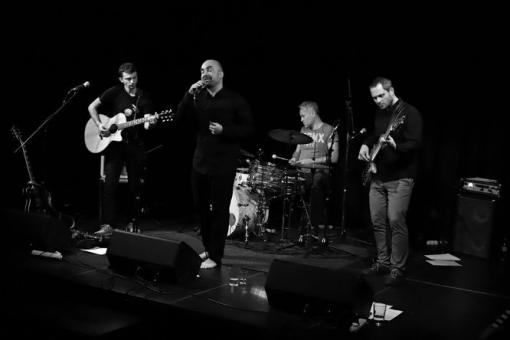Two years after the monothematic album Bleděmodré město (Pale Blue City), for which the Brno-based group Nevermore & Kosmonaut received a nomination for the genre-specific Anděl Award, the band released a new album with a mysterious name XCR-9. The subheading Písně do rakety (Songs for a Space Shuttle) reveal more. While on the last album we walked through the streets of the city of Brno together with Michal Šimíček and his band, this time the singer-songwriter, who has been using the nickname Kosmonaut for years, is taking us on a fictitious journey into space.
The band once again conceived the album conceptually. Instead of photographs of actors in the Brno backdrops, this time we find drawings by Jindřich Janíček in the booklet, which illustrate astronauts – "members of the band" on their journey "to distant places in the nearest universe". In addition, somewhere in the middle of the album, the unprepared listener will be surprised by a salutation from Jiří Grygar. The fact that the group Nevermore & Kosmonaut is inclined to the themes of universe is obvious already from its very name. However, there are additional points of contact. The guitarist Pavel Karas, aside from Michal "Kosmonaut" Šimíček the second most senior member of the group, is the head of the programme planning department of the Brno Observatory and Planetarium. And already the band's first album from 2014 was called Mezi planetami (Among the Planets).
Although the story embodied in the songs of the new album can be perceived, for example, as sci-fi, and barcodes, erased data and displays appear in the lyrics of the songs, the album contains no hilarious technological stories. In its songs, rather than zigzagging among the planets at faster-than-light speeds, the band addresses topics such as separation from home, distance (real and virtual) between people, loneliness, the need to take a rest from oneself, or the question of what we are actually hiding, and from whom. As seems implied by the song Mezi pochybami (Between Doubts), the album is actually to a great extent about the expanding inner universe. Hence, while Michal Šimíček invited us two years ago into Brno as the city of his childhood, which has been changing recently, but still retains its magical places, this time he invites us into his "private universe". And the questions he poses in that "weird" year 2020, with months of compulsory isolation, night-time curfews and emptied cities, are taking on new meaning.
The previously mentioned nomination for the Anděl Award was given to the group Nevermore & Kosmonaut in the Folk category. Given the emphasis on lyrics, the band remains close to folk music, but its sound changes and develops slightly from one album to another. The shift to pop or pop-rock was noteworthy already on the previous album. This time, it is rather the stylistic variance within the whole album that is interesting – from the acoustic folk positions through the pop of the new version of the song Mezi planetami (as opposed to the album of the same name, it has also undergone changes concerning the lyrics) to harder rock passages. Before recording the album, the band had undergone a significant transformation, as part of which Šimíček and Karas were complemented by two newcomers: the bassist Vít Sklenář and the experienced drummer Vladimír Třebický. Positive features that contribute to the varied nature of the album are not only the broad range of registers and effects used by the guitarist Pavel Karas, or the work with the bass guitar, but also the fact that as many as three members of the band take turns at the vocal microphone, and one of the songs is sung by Lada Šimíčková as a guest. Overall, there have been fewer musicians and guests compared to the last album (provided the information in the booklet is really complete), and in spite of that, the outcome even sounds a bit more colourful.
With all the varied nature of the album and despite the theme of universe, of course, the band remains within the determined musical boundaries of the selected genres. Generally speaking, this time we are getting hardly anything more than well-performed and meticulously thought-out pop or mainstream folk. Whoever is looking for experiments in music, will probably set off for a journey with different cosmonauts. On the XCR-9 album, here and there something slightly pulls your ears, such as the phrase "jako v knize Lema" ("like in a book by Lem") instead of the correct phrasing such as "v Lemově knize" ("in Lem's book") or "v knize Stanisława Lema" ("in a book by Stanisław Lem"). That perhaps would not fit into the rhyme, but rather than having a stumbling verse, it would be better to re-work it completely. However, positive impressions prevail here. Just because, as opposed to the unequivocally trustworthy Brno, the band could break their teeth on a fictitious journey into space. Such a theme might have sounded creaky and fabricated – just a theme for theme’s sake. Fortunately, this has not happened and the album XCR-9 once again functions not only as a collection of songs, but also as a continuous entity, which asks a number of questions and answers some of them in an interesting fashion.
Nevermore & Kosmonaut – XCR-9 / Písně do rakety, self-published in 2020, 9 songs and one intermezzo, total playing time: 33:03
































No comment added yet..